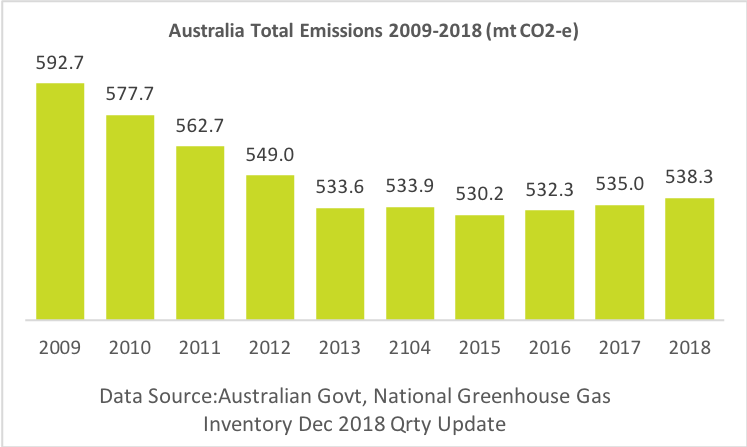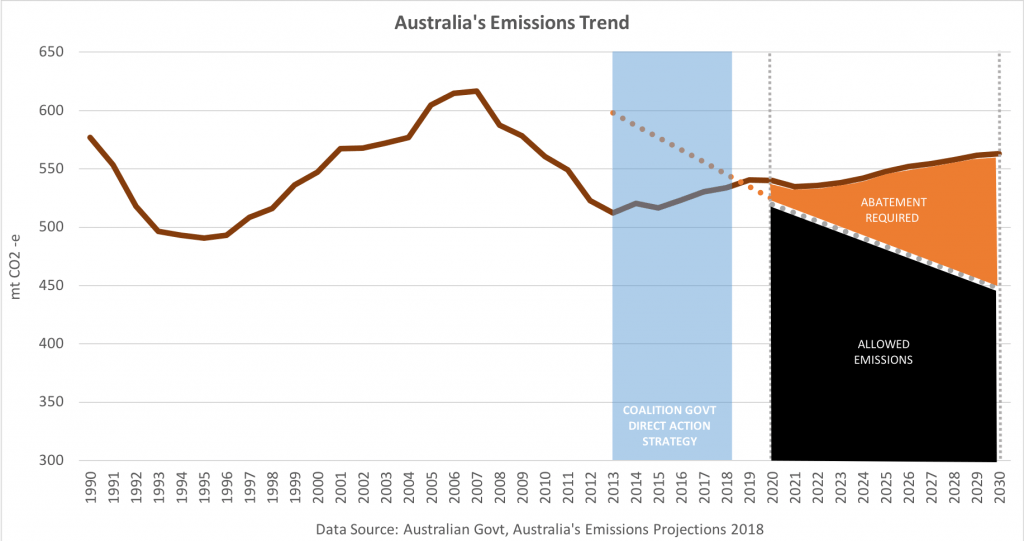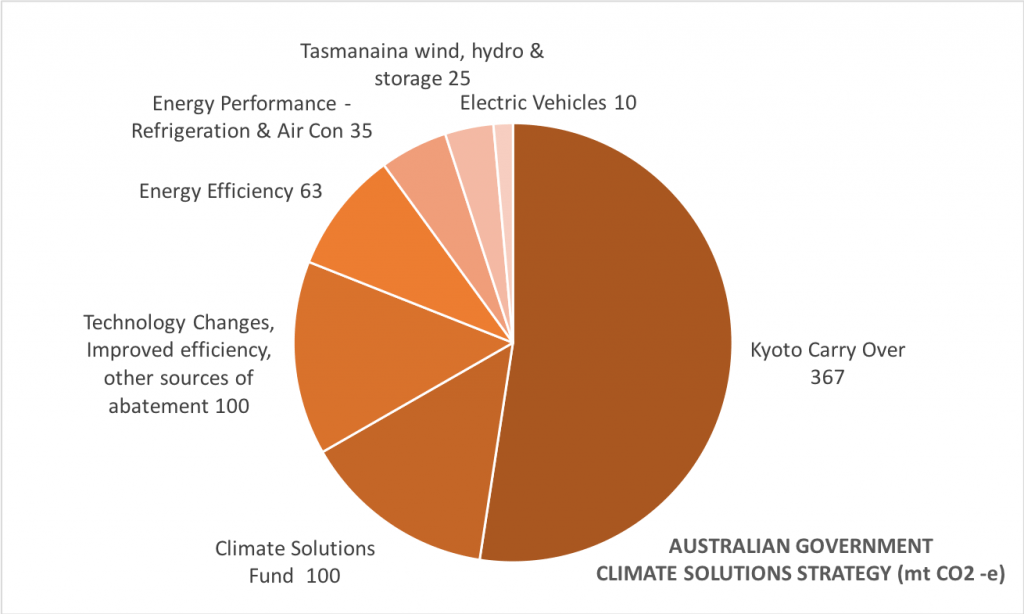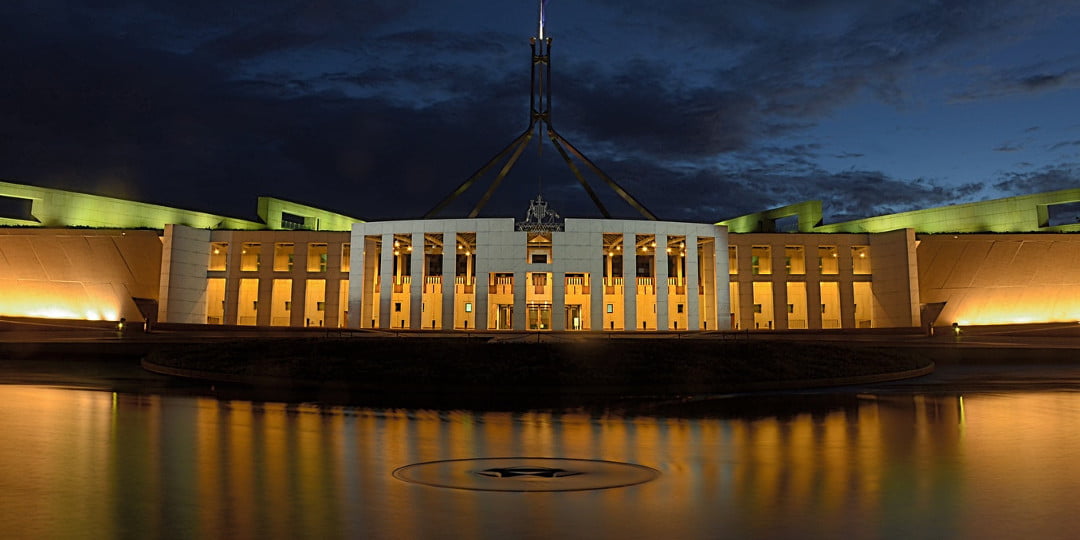Last week the Federal Government released the latest quarterly update on Australia’s greenhouse emissions. It is not pretty reading, for rather than breaking south and following a downward trend, our emissions are climbing, and have been ever since the Abbot government abolished the carbon pricing scheme and replaced it with its direct action approach.

Under the Paris agreement Australia has set itself the task of reducing our greenhouse emissions to 26-28% of 2005 levels by 2030. On current projections we will miss the target by around 700 mt CO2 -e (the area represented by the orange ‘triangle’ in the chart below).

The Prime Minister is confident we’ll get there “in a canter”. He points to the fact that the projected abatement task (the orange area in my diagram) has declined over time and argues that the Government has the policies to close the narrowing gap. This sees a number of policy initiatives that offer emissions abatements.

The biggest tool in the Government’s plan is to use Kyoto carry over credits. Before the Paris Agreement, which sets out emission reduction targets for 2021-2030, the Kyoto Protocol set out targets for the periods 2008-12 and 2013-2020. Australia negotiated very favourable targets for both periods. Consequently, we finished the first Kyoto period 128 mt CO2-e ahead of target and look like we’ll finish 240 mt CO2-e ahead for the second Kyoto period. Where most industrialised nations have said they will not count their Kyoto credits, the Australian Government has decided it will count the Kyoto “savings” as a credit against the 700 Mt CO2-e reduction required for 2021-2030. This halves the real world emission reductions we need to make from 2021-2030.
The remaining 330 mt CO2 emission reductions come from a grab bag of initiatives. Will they be successful? The only people who seem to think so are members of the Federal Coalition.
This however is not my chief concern. My concern is that the government’s policy is just another expression of the poisoned national debate around climate which in more than a decade has not been able to deliver a coherent and bipartisan approach, and a poisoned global climate politics in which nations agree that reducing emissions is vital to the future wellbeing of humankind and the planet, accept a target (such as to keep warming below 2 degrees) and then every nation seeks to do as little as they possibly can in meeting their targets.
Just last year a report by the Intergovernmental Panel on Climate Change showed that human activities had already raised global mean temperature by about 1°C above pre-industrial levels and that on current trends, 1.5 °C warming would be reached between 2030 and 2052. To have a reasonable chance of limiting warming to 1.5 without overshoot (ie a scenario where we go above 1.5 for a while but then turn it around by taking carbon gases out of the atmosphere) the world needs to achieve a 45% reduction from 2010 levels by 2030 and zero net emissions by 2050. To achieve the 2 degree goal we need 25% reduction on 2010 levels by 2030 and to reach net zero around 2070.
Getting to net zero is a massive task that will see the end of economies built on the formula of burning fossil fuels. We need to transform the ways we produce power, do agriculture, construct our buildings, transport ourselves, etc. Which is why we need our government do better than find the path of least resistance to our 2030 Paris target. We need a roadmap to net zero that lifts us above captivity to local and global politics and against which interim targets can be measured.
Under the Paris Agreement the Australian Government is due to report its long-term emissions reduction plan by 2025. Rather than this being yet another report of the Dept of Environment that will get buried in climate politics, we need something that will lift our sights to an incredible act of nation-building. Perhaps a multi year bipartisan commission that brings together climate scientists, economists, the business community, civil society and relevant experts to map the way to net zero, an agreement from all sides of politics to implement it, and that directs a nation-building project that Australians will enthusiastically get behind? One thing seems certain. Politics as usual will almost certainly fail us, the planet and the future.







